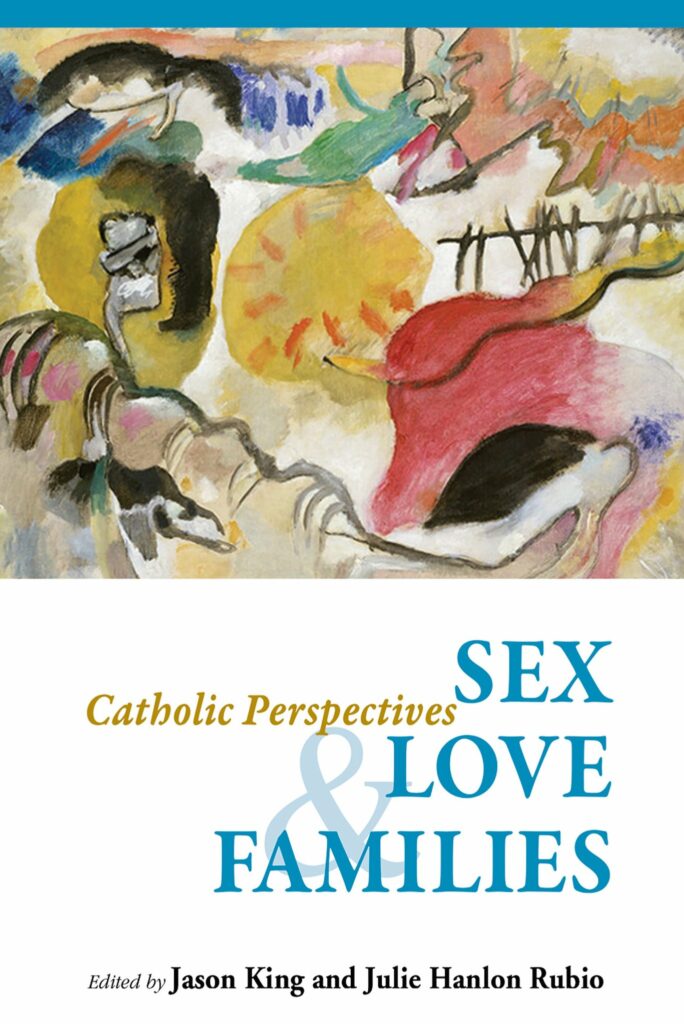“Sex, Love and Families: Catholic Perspectives,” edited by Jason King and Julie Hanlon Rubio. Liturgical Press Academic (Collegeville, Minnesota, 2020). 315 pages, $34.95.
Jason King and Julie Hanlon Rubio have come out with a compilation of essays that offer diverse perspectives on the theology of marriage and family life that is difficult to find in any other single place.
They aim, in this volume, to respond to new questions and challenges that arise from rapidly changing approaches to family, sex and love. On this front, they succeed admirably. The contributors to the volume address a breadth of issues in this area rarely found in one place together.
The volume is divided into three sections (“Sex,” “Love” and “Families”), although, as might be expected, most contributions do not fall easily into one of these three sections. Contributors to the volume cover topics such as hooking up, infertility, fatherhood, daily practices, immigration, education and screen time. This variety makes the volume a valuable addition to the college classroom.
Drawing from sociological data, psychological data and personal stories, contributors bring their theological engagement to light in a way that never allows the reader to forget the real and complex implications of the arguments on the lives of individuals and families.
A few essays stand out as covering topics necessary and under-considered among theologians: women’s sexual pain (“‘A Woman’s Pain Is Not a Gift’: Toward Sexual Flourishing for All,” Elizabeth L. Antus), incarceration and its impact on families (“Family Relationships and Incarceration,” Kathryn Getek Soltis), and the impact of privilege on parenting (“Wanting ‘the Best’ for ‘Our’ Kids: Parenting and Privilege,” David Cloutier). Taken together, these essays provide a broad picture of what it means to love and a vision of family that cuts across classes, races and life-statuses.
Each essay is short, around 10 pages. While this length allows for such a variety of topics and contributors, each essay offers only brief reflections on otherwise very in-depth topics. What is sacrificed in depth is made up for in breadth.
The reader finishes the book with the distinct impression that sex, love and family are in no way merely “pelvic issues,” but instead involve every aspect of human life and are inextricably intertwined with human flourishing on many levels.
In particular, contributors provide a view of family/sexual ethics that is distinctly entwined with the social, blurring the often too-firm line between sexual and social ethics. The heavy use of sociology reinforces this theme: the personal is the social and vice versa. All of this creates a work of theology that is eminently practical, concerned with the particulars of real lives.
This picture pulses in tune with the concerns of families, particularly the concerns of millennials and Generation Z as these age groups move into and through adulthood.
While the editors achieved their ambition of bringing together a compelling mix of nuanced views, they did not quite succeed in moving past the normal debates in the field of sexual ethics. Several of the contributors create the impression they are moving on because the debates are over and their side has won. This would not be a concern if the volume contained more balance.
The Catholic Church’s teachings that same-sex sexual relationships are not equivalent in kind to heterosexual marriages and are impermissible and that individuals ought to seek gender alignment with their natal sex are not well represented, despite being contradicted at times.
Similarly, the Church’s norms regarding marital sexuality are not well represented (Antus’ essay could especially be strengthened by such considerations), sacrificing some of the nuance that in other ways is admirably achieved here.)
Overall, King and Rubio, in this volume, succeed in making a useful contribution to the dialogue about Catholic sexual and family ethics. I strongly recommend this book for use in an undergraduate classroom (and indeed, I hope to use it in such a setting), where it will both challenge and affirm students’ engagement with their own experiences.
Outside of the classroom, it would be best read in a setting that allows for discussion and further engagement in Catholic family ethics, as it leaves the reader wanting to continue the conversations of the book.
Also of interest: “Understanding Marriage & Family: A Catholic Perspective” by Sebastian Walshe, OPraem. Arouca Press (Waterloo, Ontario, 2020). 226 pp., $17.95.
Lofgren holds a doctorate in moral theology and ethics from The Catholic University of America. She currently teaches at Mount St. Mary’s University in Maryland.

